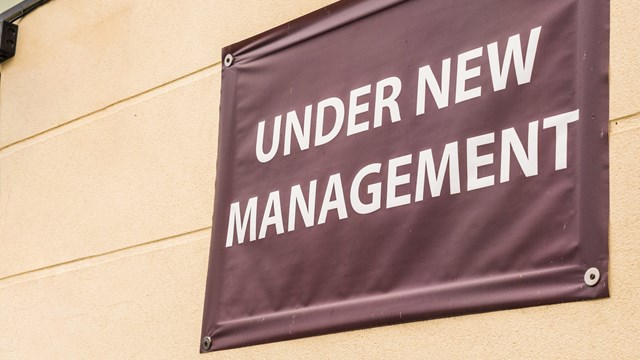Olivia Pope, the main character on ABC’s Scandal,is a professional fixer. If you have a problem—any problem—she can fix it. Over the past two seasons plus, she’s rigged elections, covered up murders, employed professional hit men, exposed secrets, made and ruined countless lives, and played hard to get with the President of the United States. But the most amazing thing about Olivia Pope is that she’s always available. Walk into her office, she’s there. Call her cell, she’ll pick up. And when she answers, she can make even the biggest problems disappear.
In another life, Olivia Pope would be a managing agent—the best managing agent who ever existed. After all, if she can rig presidential elections, she can handle complaints about noise and leaky pipes. But not only is Olivia Pope not a managing agent, she’s also not real. No one answers the phone every time it rings.
Whenever a problem arises in an association—whether it’s a leak, or a draft, or some procedural question that has come up—it’s the impulse of many board members and residents to pick up the phone and immediately call their managing agent. Most times, this is the right thing to do: the manager is first in line in a board’s or an HOA’s administrative hierarchy. That said, there’s a right way and a wrong way to call your manager—and sometimes, it’s not appropriate to call at all. Enough calls at the worst possible time, or for the most trivial matters will only make your board a total pest, and could even make your agent less enthused about helping you with future problems.
When to Call
Property managers and management companies work for co-ops, condos and HOAs, which operate 24 hours a day, seven days a week, so property management is not a nine-to-five job by a long shot. But that’s doesn’t mean its okay to call your property manager at 2 a.m. in the morning because of your neighbor’s yapping Jack Russell terrier. If it isn’t urgent, use a little discretion.
“You can call our office 24 hours a day, seven days a week because we developed our own customer care center,” says Dan Wurtzel, president of FirstService Residential in New York City. “How it works is that you call a managing agent, you get a voice prompt saying if you’d like one of our customer care representatives to assist you press #1. Then you get a live person. You ask your question and we have a record of that call. If it’s a simple question like ‘What do I have to do to hold a private party in an amenity space?’ that’s a simple request. The customer care representative will send out the proper forms and boom, it’s done. If it’s a more complicated request they will take down the information and call you back. We manage close to 600 properties and each of our buildings has anywhere between 400 and 600 questions that are building specific. Just about every question that’s asked can be answered immediately. Last year our customer care center handled over 100,000 calls.”
“I always say 9:30 in the morning to three in the afternoon is the best time to reach an agent,” adds Andrea Bunis, president of Andrea Bunis Management Inc. in Manhattan. “You come in and see what emails you had overnight and you look on your iPad and you’re clearing your phone messages from vendors, supers and shareholders. In my company, we talk to our superintendents everyday; once in the morning and once at the end of the day.”
Just as there are best times to call your property manager, there are worst times. “I don’t think it’s a good time to call a property manager at 4:30 in the afternoon,” says Stephen P. Wald, CEO and principal broker at Stephen P. Wald Real Estate Associates Inc. in New York City. “I would say the morning hours are better.”
This changes if the situation is a bona fide emergency, or otherwise urgent. In those cases, property managers will make themselves available no matter what.
“We are in the customer service business and we need to adapt and be able to communicate the way the customer wants to communicate with us,” says Wurtzel. “So if you prefer to send emails, we’ll get back to you via email. If you prefer to make a phone call, we’ll respond via phone call. If you want to have a face-to-face meeting, we’ll have a face-to-face meeting. Some people may not be on email during the day or they may want to come in during the day to visit. We can’t tell someone how to communicate with us. We have to be able to adapt to the individual.”
“If it’s an emergency, use the phone,” says Bunis, “and then follow it up with a brief email. Because two things usually happen: Everybody always says ‘I called and the agent didn’t call me back,’ and the agent says ‘I called, and they didn’t call me back,’ So if you call then follow it up with a quick email outlining the conversation and the situation, and say, ‘please keep me in the loop,’ you’ll have a written record and a follow-up.”
Why to Call
Another point about Olivia Pope: every situation she deals with is a legitimate, dire emergency. If she doesn’t produce the documents in 24 hours, the story breaks and all hell breaks loose.
This is not the case with managing agents—although sometimes board members, HOAs, and residents can think that it is. The reality is, not every problem is a matter of life and death. If the heat stops working and it’s 13 degrees and it’s the middle of the night, that needs to be addressed right away, same thing with a gas leak. Almost anything else can be handled as soon as administratively possible. Indeed, much of a property manager’s job is prioritizing.
Property managers note that in today’s society, everyone is used to instant responses—while managers would like to be able to do that, sometimes it’s just not possible, given their workload.
“If you call us, you’ll get an immediate response because somebody will pick up the phone,” says Wurtzel. “If it’s one of those rare instances where the customer care representative can’t answer the question, then an email goes out directly to the property manager so the property manager to follow up. So there is an instantaneous flow of information. The managing agent is then responsible for responding and going on his or her computer indicating that the response has been satisfied and closed out. We’ll have a record of that information.”
“It all depends on the nature of the call,” says Bunis. “We try to return our calls within 24 hours. If it’s an email, it’s usually 24 to 48 hours.”
If you’ve called or emailed your property manager the time in which you get a response often depends on the urgency of the situation, but you should get a response within 24 hours. There are those impatient residents and board members who, if they don’t get a response to an email in an hour, send the email again. If three hours go by, they begin calling and demanding to speak to a manager—or the manager’s boss. Sometimes, an immediate response is not possible, or necessary.
“An urgent matter is a leak, a flood or a fire,” says Bunis. “We have an emergency service. If you call our emergency service what happens is that an agent on call is notified and he or she will take the appropriate action. A not so urgent matter is that you have a mouse in your house. The mouse is not going to wait for us to get there. A broken elevator in the middle of the night is not urgent because we are not going to send someone there at 2 a.m. in the morning and pay overtime. That can wait till morning.”
One way that both boards and HOAs and managing agents can be proactive is to alert homeowners of projects in the building. If there’s banging and clattering at seven in the morning on a Wednesday, residents might call in droves to complain. If the manager sends around a notice explaining that maintenance workers are coming early Wednesday to repair the heating pipes that will eliminate all those extra calls.
The general consensus among property management professionals is that most companies should have an open door policy where comments and feedback are welcome, but equally important is insuring that everyone follows a protocol that is put into place.
Greg Olear is a freelance writer and frequent contributor to The Cooperator. Staff writer Christy Smith-Sloman contributed to this article.







Comments
Leave a Comment